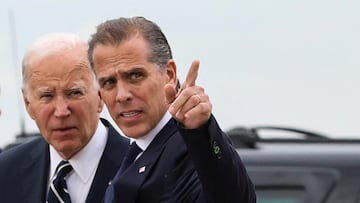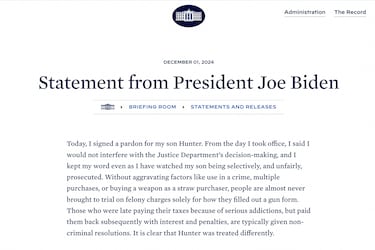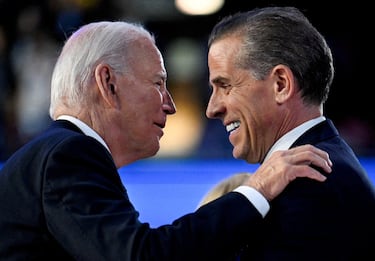5 of the most controversial presidential pardons in US history
President Biden’s decision to pardon his son, Hunter Biden, raises questions about other controverisal pardons made by past presidents.


Though President Joe Biden had stated that he would not pardon his son, Hunter, after he was found guilty in a federal court of lying about his substance abuse issues to purchase a firearm, he has changed his tune. The White House announced that Hunter Biden would receive a pardon.

Pardons or Clemency for Family Members of US Presidents
Depending on who you ask, many controversial pardons have been issued by American presidents. However, the case of Hunter Biden is one of the few that involves family members. Two presidents—Bill Clinton and Donald Trump—both granted clemency to family members, which differs from a pardon in that the individuals were no longer incarcerated or facing the threat of incarceration.
In 2001, just before leaving office, President Clinton pardoned his half-brother, Roger Clinton. However, Roger was no longer in federal prison; the pardon served to remove his federal conviction from the record.
More recently, Donald Trump used the power of the presidency to pardon his son-in-law’s father, Charles Kushner, who was convicted on charges related to campaign finance violations and tax evasion. Similar to the case of Clinton’s half-brother, Kushner was not in prison when the pardon was issued.
President Biden’s pardoning of Hunter, before he is sentenced, is unprecedented in US politics.

The pardoning of Richard Nixon
After the Watergate scandal led to President Richard Nixon’s resignation, his vice president, Gerald Ford, pardoned him for his crimes.
The pardon, though controversial among certain segments of the public, particularly some Democrats, was seen as a way to allow the country to move forward and avoid the social turmoil and embarrassment that could arise from a former president facing trial for politically motivated crimes. President Ford paid a political price for his decision to pardon Nixon. While he was initially popular and well-liked by the public when he took office, his favorability dropped rapidly after the pardon was issued.
Chelsea Manning and the Collateral Damage video published by Wikileaks
It is easy to understand why pardoning family members is controversial, as it cannot shake accusastions of nepotism and special privileges. It’s hard to believe that a country with a healthy judiciary would need direct presidential interventions in cases involving family members. However, pardons can also stir outrage among organizations and individuals who have an interest in seeing certain actions or behaviors criminalized.
Just before leaving office, President Barack Obama pardoned Chelsea Manning, a former US military member who leaked confidential information to WikiLeaks founder Julian Assange. One of the videos released was titled “Collateral Murder,” which showed the killing of two Reuters journalists while they were under attack. The disturbing footage gave people in the US and around the world a glimpse into the carnage carried out by US soldiers, which was deeply embarrassing and discrediting for the military.
Manning was found guilty of providing the videos to WikiLeaks, but journalists and advocates for press freedom harshly criticized the decision. While it may be one thing to cover up horrific atrocities, punishing those who expose the crimes is viewed as an attack on the press. Journalists often rely on anonymous sources who believe that information obtained under security clearance must be brought to light, even though they risk severe consequences if the leak is traced back to them. Manning’s case is a clear example of what can happen to those who attempt to shed light on events that powerful governments would prefer to keep hidden and how an example can be made of someone who engages in actions that violate the interests of the state.
Pardons for those who do the state’s bidding
Related stories
In contrast to the pardon of Chelsea Manning, President George H. W. Bush pardoned several members of the Reagan administration who had been found guilty in the Iran-Contra affair. This scandal involved the illegal sale of weapons to Iran to fund the Contras, a right-wing paramilitary group in Nicaragua. The weapon sales violated US law, as sanctions had been imposed on Iran following the 1979 Iranian Revolution. Soon after the investigation into these illegal activities began, key documents were destroyed, which hindered efforts to uncover the full extent of the involvement of those within the administration and the scale of the operation.
Get your game on! Whether you’re into NFL touchdowns, NBA buzzer-beaters, world-class soccer goals, or MLB home runs, our app has it all. Dive into live coverage, expert insights, breaking news, exclusive videos, and more – plus, stay updated on the latest in current affairs and entertainment. Download now for all-access coverage, right at your fingertips – anytime, anywhere.
Complete your personal details to comment